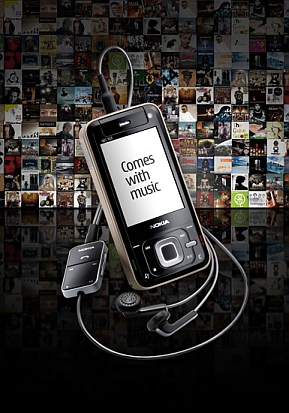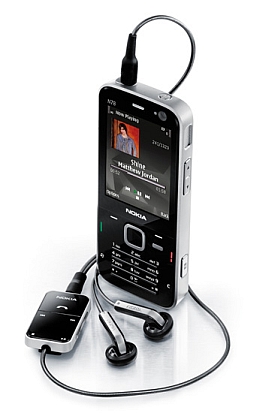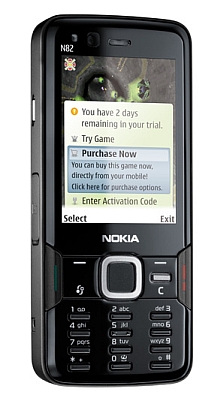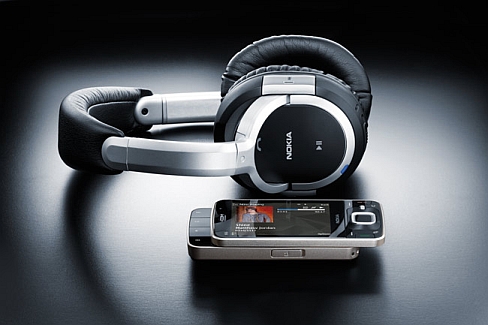We're about to get "Comes With Music"... why not videos, games and apps too?
 Last December, Nokia announced a pioneering
new service called "Comes With Music". The basic idea is very simple:
you buy a Nokia phone labelled with the "Comes With Music" brand, and you can
use it to legally download as much music as you want for a year, and
keep the downloaded music forever.
Last December, Nokia announced a pioneering
new service called "Comes With Music". The basic idea is very simple:
you buy a Nokia phone labelled with the "Comes With Music" brand, and you can
use it to legally download as much music as you want for a year, and
keep the downloaded music forever.
As Nokia's chief executive Olli-Pekka Kallasvuo put it, the people
testing the system thought it was almost too good to be true, but it
was true. In the press conference afterwards, some journalists were
extremely sceptical about how anyone could possibly make money under
such an arrangement.
In fact, "Comes With Music" does make a lot of sense economically, and
may provide the music industry with its best way yet of fighting piracy
because it makes piracy completely irrelevant. If you can legally
download as much music as you want for a year, and keep it forever, why
would you bother pirating at all during that year?
How "Comes With Music" makes economic sense
When piracy is discussed, the pro-piracy and anti-piracy lobbies
usually go to unrealistic extremes. The anti-piracy lobby often counts
every pirated album as a lost sale, and comes up with a ludicrously
huge estimate for how much money the music industry has lost. The
pro-piracy lobby counters by claiming that no pirated albums are lost
sales because people wouldn't have bought most of them anyway (but
their stupidity is failing to make the crucial distinction between
"most" and "all").
The truth is of course probably somewhere in the middle: the majority
of pirated music isn't lost sales BUT a small percentage may well be.
It's perfectly plausible that someone doesn't buy an album because
they've already downloaded a pirated copy. That's a lost sale.
Realistically, what the music industry stands to lose from piracy is
the average amount we would have spent on legally buying music.
For example, if the average person spends 100 euros a year on music,
then the most that could be lost to music piracy in a year is 100 euros
per person. Any music pirated beyond this average spend is not lost
sales because the person probably wouldn't have spent that much on
music. BUT, music pirated under this average value may well be lost
sales.
This might sound a bit complicated, but it leads to one exciting truth:
if the music industry can get us to spend a certain amount per year on
music, piracy becomes irrelevant.
And that's where "Comes With Music" comes in.
 We've got our year's money, so you can do what you like now
We've got our year's money, so you can do what you like now
A scheme such as "Comes With Music" lets the music industry get their
yearly profits from the consumer up front. The consumer buys a "Comes
With Music" phone, and a certain portion of the phone's price goes
straight to the music industry. That means that the music industry have
done their job, they've collected their fee, and they no longer need to
worry about making a profit from that person for the next twelve months.
Once the music industry has a year's worth of profit from that person,
they might as well let that person download as much music as they want,
because none of it will be lost sales. In other words, it gives us the
benefits of piracy but without the downside of lost sales. As Del Boy might say, everyone's a winner, luvvly jubbly!
Of course it's not quite that simple, there will be lots of arguments
about how much this annual fee should be, and arguments over how to
share the annual fee between artists, but in general this seems like a
very good idea. It's very likely that other companies will follow
Nokia's lead in introducing this kind of service, and it could well
become the standard way of buying music in the 21st Century, completely
replacing traditional retail.
It needn't just be confined to phones either. The same business model could be used on music players, games consoles, PCs and all kinds of gadgets that have multimedia capabilities and an internet connection. Manufacturers, ISPs and phone networks might all negotiate similar deals.
But why stop at music? What about films? How about "Comes With Movies"?
The reason "Comes With Music" is now possible is because the
distribution costs of music have fallen to zero. It costs virtually
nothing to send an album from one side of the world to the other in
digital form, and it can be done within a few minutes. This brings up
the possibility that the same scheme could be applied to many other
things that are sold as digital downloads.
Videos are probably the most obvious example, the film industry is very
similar in structure to the music industry, and it seems plausible that
we may see a "Comes With Movies" service being offered by someone in
the next few years, especially if "Comes With Music" and its clones are
successful.
This may take a bit longer than music to happen though, partly due to the much
larger size of video files compared to audio files. The costs of
distributing high definition films aren't as close to zero as the costs
of distributing music tracks. (Eventually though, this difference will
become insignificant.)
 And games? Will we see a "Comes With Games"?
And games? Will we see a "Comes With Games"?
Games are another popular form of entertainment which can be sold as digital downloads, and the games industry is also dominated by a few large multinational companies, very much like the music and film industries. If a "Comes With Games" deal could be done with the major publishers, that would allow most popular titles to be downloaded on an "all you can eat" basis.
However, there's a serious obstacle to
such a deal: some of the major games publishers including Nintendo and
Sony are also manufacturers of games console hardware, and they will be
very reluctant to share a gaming platform with each other.
Another major problem is that unlike films or music, games are written
for particular hardware platforms. You can play music files or video
files on virtually any computing device, but most games will only work
on a very small number of devices, perhaps only one kind of device.
A way round this problem might be for the hardware platform holders (on
consoles that's currently Nintendo, Sony and Microsoft) to each set up
their own "Comes With Games" service, with the consoles themselves
costing a lot of money up front but the games downloads would cost
nothing at all. However, pirated console games are generally more difficult to obtain and use than
pirated music and video, so there's not as much pressure on the games
industry to respond to piracy.
PC games are another matter entirely though, as it's much easier to
download and install pirated PC software. If games publishers ever do
come up with some kind of "all you can eat" deal, it seems likely it
will begin as a "Comes With PC Games" service.
Turning back to Nokia for a second, perhaps we might one day see a "Comes With Games" service for N-Gage-compatible phones?
And "Comes With Applications"?
This is where things get interesting, because computer applications are
starting to become web-based. That means that they're practically
impossible to pirate because they'd be online services rather than an
offline product.
If applications all move onto the web as subscription services, or
services supported by advertising, then that would pretty much end
application piracy, and remove any need for a "Comes With Apps"
service. Under those circumstances it's extremely unlikely that any
kind of "all you can eat" deal would emerge for applications.
It's worth noting that this may eventually happen to games too, as
web-based platforms such as Flash become increasingly sophisticated.
Some classic games such as Lemmings are already playable as online
services, albeit unofficially.
But wait... hang on... what if you want music, video and games all on one device?
If we do see "Comes With Movies" and "Comes With Games" services
emerging, the idea of including a service's cost in the price of the
device may need a rethink.
If we assume a year's unlimited music costs 100 euros, that might
reasonably be added onto the price of a device. But if we also assume a
year's unlimited video would cost 100 euros then you'd have to add 200
euros if someone wants both, and if games were also 100 euros that
would be an additional cost of 300 euros. At that price level, all
being paid up front, a lot of people might start reconsidering piracy.
An alternative to this would be some kind of monthly subscription. 300
euros over the course of a year would be 25 euros a month, which would
be pretty reasonable considering you'd be getting unlimited music,
films and games.
(NB: Just to reiterate, the 100 euros figure per service is completely
made up, we have no idea what these services would really cost!
However, the price of "Comes With Music" will probably be something on
the same sort of scale as 100 euros plus the cost of the phone.)
So, will this actually happen?
"Comes With Music" will definitely happen, Nokia's already announced it
and done a deal with Universal Music to provide the content. The music
download technology is in place, you can already download
music straight onto your Nokia smartphone. If "Comes With Music" is a
success then we will almost certainly see it copied by many other
companies, and it could gradually replace the conventional retail music
model.
If "Comes With Music" and its clones become popular, then the next
obvious candidate for a similar treatment would be video. However, as
noted above, it may take a while longer. Most people don't yet have fast enough
connections to download large amounts of high definition video, and the costs associated
with video distribution are still much higher than for audio
distribution.
Similar schemes for games and apps seem much less likely to happen,
though if music and video go down this path successfully then someone's
bound to try it with software sooner or later, especially games.
Alas, it seems unlikely that anyone will ever provide a "Comes With Indian Takeaway" service.

